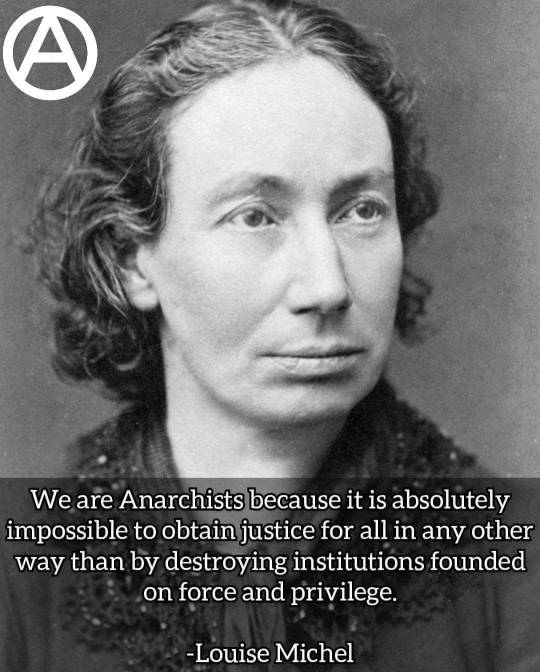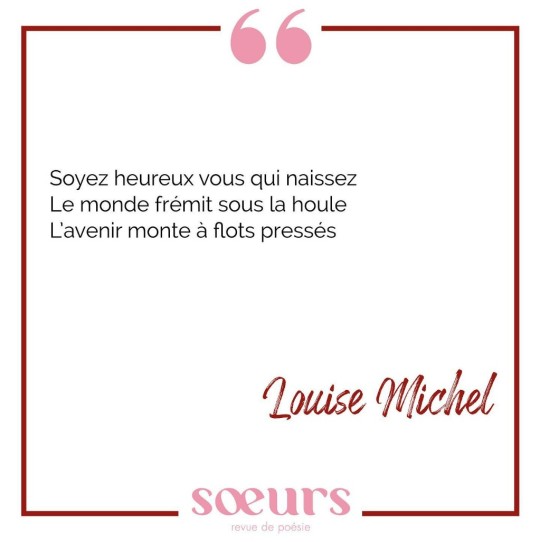#louise michel
Text

Cover of the October 1895 issue of "Liberty", an English anarchist journal featuring works from anarcho-feminists Louise Michel and Emma Goldman and other prominent anarchists.
Read it here.
36 notes
·
View notes
Text
Power is cursed, that is why I am an anarchist.
-- Louise Michel

#Louise Michel#leftistquotes#book quotes#quotes#quoteoftheday#book quote#life quote#beautiful quote#quote#quotable#161#1312#anarchism#anarchist#anarchocommunism#anarchopunk#anarcho syndicalism#anarchofeminism#anarchy#ausgov#politas#auspol#tasgov#taspol#australia#fuck neoliberals#neoliberal capitalism#anthony albanese#albanese government#eat the rich
25 notes
·
View notes
Text

On ne peut pas admettre qu'il y ait encore des gens qui crèvent la faim quand d'autres ont des millions à dépenser en divertissements. C'est cette pensée qui me révolte.
Louise Michel
23 notes
·
View notes
Text
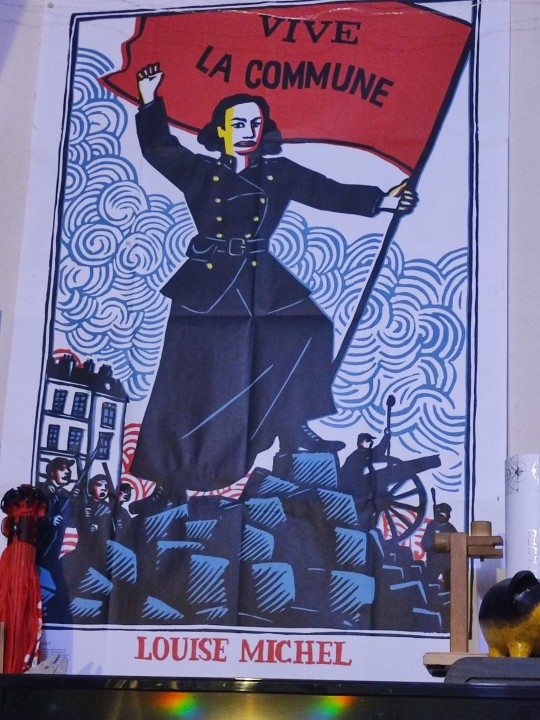
i put Louise Michel above the TV so i can never ignore her
7 notes
·
View notes
Text
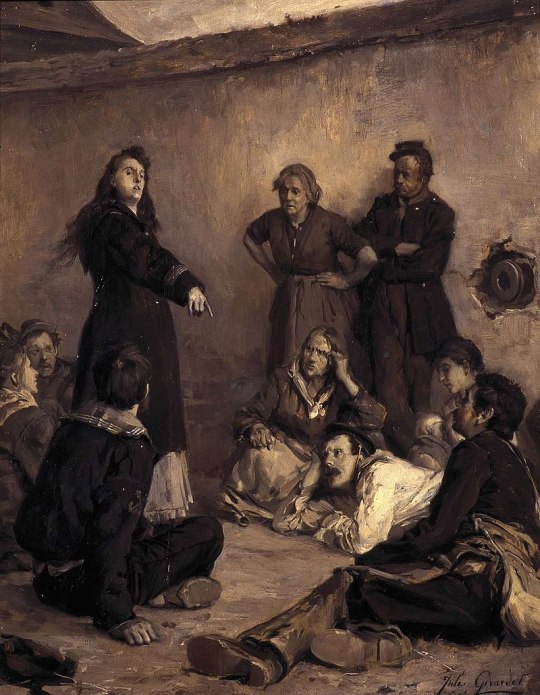
Jules Girardet - Louise Michel a Satory (1871)
85 notes
·
View notes
Text
Rewatching Little Women 2019 remake because it's the right period for it and watching some interviews with Greta Gerwig and the cast, I'm struck try the absolute refusal of straight women to acknowledge that a woman whose creation/work they enjoyed was actually a lesbian. In this instance: Louisa May Alcott.
Greta Gerwig is obviously talented, educated and intelligent. She must know this yet she states over and over that Louisa May Alcott never married and never had kids. Yeah. BECAUSE SHE WAS A LESBIAN.
The word lesbian never passes her lips. A supposedly feminist film, directed by a woman, with a cast comprised of mostly women. Yet saying lesbian is still taboo.
Sespursongles said it best and I will quote her:
“But of course there are also lots of very talented lesbian writers, the problem being then that no one acknowledges them as lesbians, because lesbophobia — or they don’t want to be recognised as “lesbian writers” as it might kill their career. The “lesbian lit is crap” belief doesn’t hold when we know that many gifted artists and writers in history were lesbians, but 1) you can’t point it out because all nonlesbians would start obsessively dissecting their lives to prove het attraction, and 2) of course they couldn’t apply their gift to writing about lesbians (or themselves) because then they would never have become literary figures; only bihet people are allowed to write about their experience. This might have created in some cases a kind of catch-22 where the talented lesbian writers who knew they had a chance of making it big didn’t write about lesbian stuff because that might have killed their chances, while the less-gifted writers who knew they weren’t likely to become great literary figures were the ones who wrote lesbian stuff since they weren’t afraid of having something bigger to lose.”
In this case, there’s the added bonus that Jo is clearly Louisa May Alcott herself (self-insert) and if LMA had had her say, Jo would have remained a spinster (aka a lesbian) but a lot of straight women identify with her character because she is the most interesting, complex and frankly cool character in the book. Nobody is identifying with boring Meg who only wants to get married and pop babies, that’s for sure.
So admitting that Jo is lesbian-coded would mean for straight women that they can longer project themselves onto/identify with Jo. Because god forbid they would identify with a lesbian.
No way.
This reminds me of the shitshow that occurred a few years ago with the movie Ammonite and how FURIOUS straight feminists were that Mary Anning had been turned into a lesbian. The horror. Granted, we don’t know whether Mary Anning was a lesbian. The fact is, she never married.
Which was het feminists’ entire reasoning: why don’t we let her be single! why can’t women be single! Why does romance always have to be pushed on women! blablabla
Meltdown ensues.
Hum. Funny you’re all saying that when you never choose that life for yourself. You know: the single, childfree life. Funny you’re now super invested that a woman who is considered to be the first paleontologist and who never married should apparently remain single because she is being portrayed as a lesbian in one movie that you will never watch anyway.
It’s almost funny how they can’t hide their prejudice and lesbophobia when it’s clear that the default for them should be heterosexuality and what bothered them so much was the lesbian representation.
So let’s recap: Louisa May Alcott: Lesbian
Marguerite Yourcenar: Lesbian
Vivian Maier: Lesbian
Louise Michel: Lesbian
Anne Lister: Lesbian (hard to deny, this one)
#lesbian#lesbian figures#Louisa May Alcott#Marguerite Yourncenar (who never wrote about lesbians despite being one - judging you Marguerite)#Louise Michel#Anne Lister#Vivian Maier#Ammonite#Mary Anning#honorary lesbian?#who knows
63 notes
·
View notes
Photo
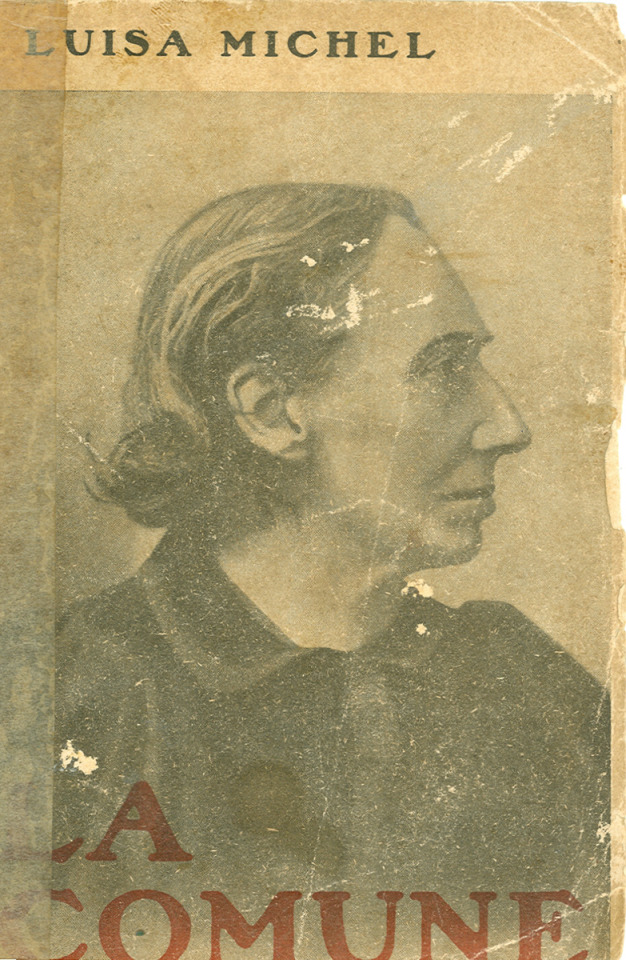
Louise Michel, (1898), La Comune, Foreword by Pietro Gori, Casa editrice sociale, Milano, 1922 [Biblioteca Libertaria "Armando Borghi", Castel Bolognese (RA)]
#graphic design#book#cover#book cover#louise michel#pietro gori#casa editrice sociale#biblioteca libertaria armando borghi#1890s#1920s
49 notes
·
View notes
Text
Oi! Aqui está a tradução em português do poema da Louise Michel para o Saint-Just, por mim :D
(english translation shared by @/siecleetcieux here)
(versão original em francês, pág. 20)
under the cut…
Sombra de um cidadão, Saint-Just, eu te saúdo!
Venha, irmão, fale para mim: teria a hora chegado?
Vão cair os Faraós?
Vê, frequentemente a noite, quando o horizonte está escuro,
Eu ando e sonho, e perto de mim, tua sombra
Surge e parece falar comigo.
E nós dois andamos juntos, eu na penumbra hesitante,
Você na eternidade; nós andamos, e o vento de Bise
Chora pelos mortos e proscritos.
E tudo aquilo que antes deslumbrava o mundo,
A liberdade, a honra, parecem dormir sob a onda.
Até o silêncio tem seus gritos.
Um imenso hecatombe, um sepulcro, um covil,
Veja o que eles fizeram da pátria, oh irmão,
A águia desceu de sua rocha,
Os chacais se arrastaram, a vil hiena veio
E não se vê mais nada na terra e nas nuvens,
Poderia o futuro abdicar?
Vês o que eles, estes lobos, fizeram com a República?
Este povo de coração apaixonado, esse povo magnífico
Tomou como mestre um mercenário;
Ele não se ergue mais ao som de sua história;
Até sob a chibata; é inacreditável,
Sua vergonha é de aterrorizar.
Oh! Pelo menos, no passado, nas vossas lutas sangrentas,
O coração batia facilmente, e asas gigantescas
Carregavam no alto o vosso espírito:
Podia-se, quando morrendo em praça pública,
Exclamar do patíbulo: “Vida Longa à República!”
Oh! Isso era grandioso e isso era belo!
Hoje em dia, tudo está silencioso; todos estão escondidos nas sombras,
Para que eles não falem mais, esses prisioneiros sem número,
Pois a morte faria muito barulho.
E quando vemos, de vez em quando, que esta agonizante
Que nós chamamos de França, murmurou, morrendo,
Um suspiro nesta horrível noite;
Quando ela estremeceu de vergonha ou raiva;
Este homem que a oprime, besta horrível,
Sobre ela estende seus braços horrendos!
E nós suportamos isso! Esse insignificante nos domina!
O anão [Napoleão III] tomou como pedestal uma colina
E nós o olhamos de baixo.
Oh! Vocês nos desprezam, vocês, sombras magnânimas,
Que deram, tremendo de seus desejos sublimes,
Até mesmo a bondade de seus corações.
Vocês que souberam como eliminar no fundo de suas almas
Toda fraqueza humana, vocês que foram tratados de infames,
Assustadores e sagrados guias!
Oh! Vocês eram tão puros, mas também implacáveis,
E vocês eram tão grandiosos, formidáveis apóstolos
Da augusta fraternidade.
Mas, enquanto meus olhos se enchiam de lágrimas,
Uma noite, eu ouvi um barulho de armas vindo de longe
No silêncio repetido.
Eram eles! Os gigantes, os terríveis arcanjos
Que para abrir o caminho puseram em suas falanges
A Morte, como se põe um ceifador.
Foram eles que, com o coração sangrando pela vítima,
Abateram o soberano, mostrando de longe o abismo
Aos reis lívidos de terror.
Enquanto eu assistia à essa coorte sombria,
Um deles, separando-se, chegou perto de mim nas sombras,
E estendeu-me suas mãos pálidas,
Como as estende um irmão após dias de ausência,
E eu li através de sua alma, no meio do silêncio,
O terrível julgamento dos destinos.
Nós dois parecíamos ter quase a mesma idade,
E quer fosse a alma, ou o ar, ou o rosto,
Seus traços eram parecidos com os meus.
E Saint-Just me disse na língua eterna,
“Escutas, na noite, essa voz que te chamas,
Escuta, a hora é agora, vem!”
2 notes
·
View notes
Text
Solo la anarquía puede hacer consciente al hombre, solo ella lo hará libre; la anarquía será la separación completa entre los rebaños de esclavos y la humanidad.
Louise Michel
3 notes
·
View notes
Text
btw idk if I've ever actually said it but in my headcanon Enjolras' given names are Louis Michel (he would go by Michel if everyone didn't call him by surname)
And yes, it's in honour of Louise Michel, his real life incarnation and the original Enjolras fangirl
#enjolras#louise michel#it also works as a reference to the archangel#i do also like alexandre for him#but i prefer this reference#it's more fitting#les mis
29 notes
·
View notes
Text
Books I have read in January 2023 & my opinion on them !
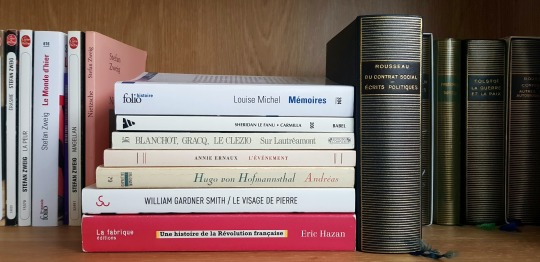
Discours sur les sciences et les arts, Discours sur l’origine et les fondements de l’inégalité parmi les hommes & Discours sur l’économie politique, Jean-Jacques Rousseau, 1749 & 1755 | Mentally preparing to (re)read The Social Contract next month.
Carmilla, Sheridan Le Fanu, 1872 | Liked it! Kinda want to read more classics written in English!!
Mémoires, Louise Michel, 1886 | Very well written, a bit repetitive towards the end but really, what a woman ! Her writing shows just how full of life she was, even when she thought she had nothing left but a heart of stone after her mother died. I loved the descriptions of New Caledonia. Her ideas on revolution, especially the role of women - and life in general are still fresh. Really, the best book I have read this month.
Andréas and other stories, Hugo von Hofmannsthal, 1907-1927 | Nice short stories. The settings vary a lot so the atmospheres were very different but all of them were somewhat obscure and dark. I wasn’t a fan of Hofmannsthal’s poetry but those were much more to my taste!
The Stone Face, William Gardner Smith, 1963 | I think this was recommended to me here but I am not sure. I didn’t like it as much as I thought I would. The theme of the book is brave and interesting, considering the Algerian war of independance is still a very touchy subject in France (a lot of ppl don’t call it a war). But the narration is so didactic the book felt like a moral lecture (which I don’t need as I am an adult capable of critical thinking and drawing nuanced conclusions). Some details are just unnecessary and weird and not making any of this believable. It takes a lot away from the ending, which is more interesting and touching. Overall, the statements the book makes are lacking nuance and depth.
Sur Lautréamont, Maurice Blanchot, Julien Gracq et J. M. G. Le Clézio, 1987 | Forgot how much I loved Les Chants de Maldoror, kinda want to read it again.
L’évenement, Annie Ernaux, 2000 | I don’t know what to think of this. Some really beautiful parts, some I didn’t really like (authors writing about them writing is not my thing at all, even if in this book, it doesn’t come off as self-centered all the time). The ending is more bitter than I expected, which I liked (I saw the movie inspired by the book last year and the ending felt a bit fake). Maybe it’s the kind of book that will stay in my mind for longer than expected but I doubt it.
Une histoire de la Révolution française, Eric Hazan, 2012 | In short, a good synthesis of many different authors who worked on the Frenc Revolution. It has the quality of displaying various interpretations of historical events and sometimes adding new interpretation. Not as complete as Soboul’s book, not a ton of the author’s original ideas. I knew a lot of what is presented already but it was still a good read.
#posting this a bit late#do reads#do read list#book#books#bookblr#book rec#books rec#book recommendations#book review#reading#reading journal#rousseau#jean-jacques rousseau#carmilla#le fanu#sheridan le fanu#louise michel#andréas#hofmannsthal#hugo von hofmannsthal#the stone face#william gardner smith#sur lautréamont#lautréamont#maurice blanchot#julien gracq#le clézio#l'événement#annie ernaux
20 notes
·
View notes
Text
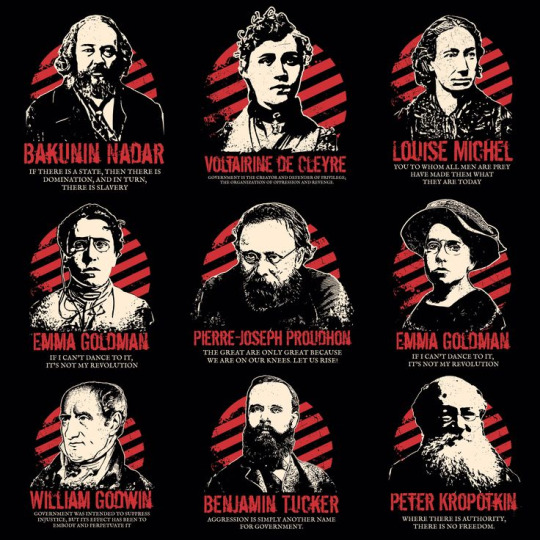
#mikhail bakunin#voltairine de cleyre#louise michel#emma goldman#pierre joseph proudhon#williamgodwin#benjamin tucker#peter kropotkin#antifa#antifascist#antifaschistische aktion#anarchism#anarchist#anarchocommunism#anarchopunk#anarcho syndicalism#anarchofeminism#antiauthoritarian#antinazi#anti capitalism#anti police#anti cop#eat the rich#eat the fucking rich#ausgov#politas#auspol#tasgov#taspol#australia
8 notes
·
View notes
Text
In 1923, Emma Goldman wrote to Magnus Hirschfeld concerning a profile of Louise Michel in Hirschfeld's Jahrbuch für sexuelle Zwischenstufen in which it had been argued by a contributer that Louise Michel had been an Uranian.
Having known Louise Michel personally, Emma Goldman requests from Hirschfeld that he publish her rebuttal of the former article, as she believes it to be mistaken and reliant on a stereotypical view of women.
Of her own beliefs, she writes:
"Before I deal with von Levetzow's article, permit me to say this: It is not prejudice against homosexuality or the aversion to homosexuals which prompts me to point out the errors in the claim of the author. If Louise Michel had ever demonstrated homosexual traits to those who knew and loved her, I should be the last person to attempt to clear her from the "stigma". [...]
Years ago, when I knew nothing at all about sex psychology and when my only acquaintance with homosexuals were some of the women I had met in prison where I was incarcerated for my political opinions, I came out in defense of Oscar Wilde. As an Anarchist, my place has ever been with the persecuted. I saw in the persecution and prosecution of Oscar Wilde reflected the cruel injustice and hypocrisy of the very society which sent him to his doom. Hence my defense of him.
Later, I went to Europe, and there came upon the works of Havelock Ellis, Krafft Ebbing, Carpenter, and many others which made me see the crime against Oscar Wilde and his kind, this time, in a more glaring light. From that time on I used my pen and voice in behalf of those whom nature, herself, has destined to be different in their sex psychology and needs. Your works, Dear Doctor, have helped me much in shedding light on the very complex question of sex psychology, and in humanising the attitude of people who came to hear me.
From this, your readers will see that I have no prejudice whatever, or the least antipathy, to homosexuals. Quite to the contrary. I have among my friends men and women either complete Urnings or Bi-Sexuals. I have found them far above the average in intelligence, ability, sensitiveness and charm. I feel deeply with them, because I know that their sufferings are greater and more complex than that of most people. There is, however, one predominant tendency among homosexuals which I must oppose. It is their attempt to claim every outstanding personality for their creed, to ascribe to them traits and characteristics inherent in themselves."
After debunking the former article, she goes on to say:
"You will agree with me, I am sure, that neither the question of homosexuality or of the homosexuals can gain anything by a misstatement of facts."
The same can be said for the trans cause. This letter, which can be read in its entirety here, is the source of a quote which is often mistranslated (across time, not languages) when used in isolation. It is often claimed that where Goldman writes "I have among my friends men and women either complete Urnings or Bi-Sexuals" one should read "I have many friends who are trans."
While Uranians (and even more so Urningen, the German equivalent) most certainly referred to a group of people that included people we would call trans today, we can see from the context that that's not what Goldman is referring to.
Due to the lack of strong distinctions between (in modern terms) gay and trans people at that time, it's entirely possible that among the friends she was referring to there were trans people. It is however misleading -- both in general, but particularly in context -- to translate "Urnings" or "Uranians" as "transgender". It can of course also be misleading to translate it as "gay" without any caveats, but in the context of this letter, it is not significantly so.
By the 1920s, "bisexual" also tended to mean the same thing it does today. Had the letter been from the turn of the century, I would be inclined to believe she meant intersex people, but both the dating and the context indicates that she means "bisexual" in the modern sense.
Had Goldman meant to reference trans people specifically, the word "transsexual" would not have been available to her yet (Hirschfeld coins it later the same year), but she would likely have used the word "transvestite" (as Hirschfeld did prior to coming up with "transsexualismus").
Now do I find it likely that Emma Goldman supported the trans people of her time? Most certainly. She could hardly be as admiring of Hirschfeld as she plainly is in this letter without being pro trans. That quote is not the slam dunk some people treat it as, however.
Frankly, throwing that quote around like that is just ammo for TERFs, because it enables them to claim that trans people are "usurping" gay history or other such nonsense (as if the two can even be sensibly disentangled).
#emma goldman#uranian#urning#1920s#20th century#magnus hirschfeld#terminology#Jahrbuch für sexuelle Zwischenstufen#louise michel
15 notes
·
View notes
